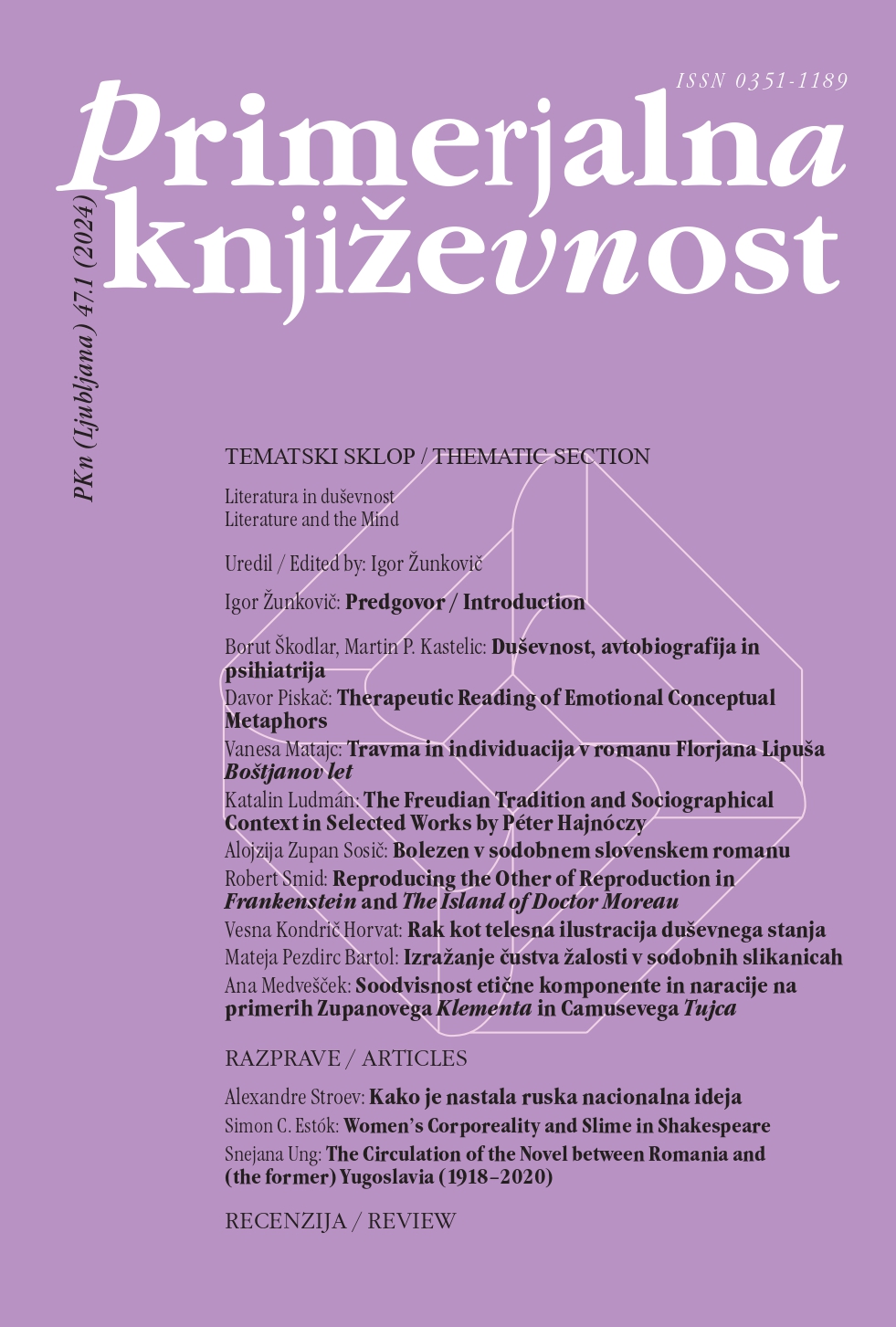Therapeutic Reading of Emotional Conceptual Metaphors
DOI:
https://doi.org/10.3986/pkn.v47.i1.02Keywords:
bibliotherapy, therapeutic reading, conceptual metaphor, emotional metaphor, symbolic modelling, cognitive therapyAbstract
The purpose of this paper is to explore the potential for therapeutic reading through the interdisciplinary integration of the cultural system, namely literature, with the psychological system. Therapeutic reading is examined from the standpoint of cognitive science, primarily through the lens of cognitive narratology and, on the other hand, cognitive therapy as a psychological method. This interdisciplinary approach is feasible because both referenced systems employ the term metaphor, or more specifically, conceptual metaphor, in nearly synonymous ways. Within the realm of conceptual metaphor, a special focus is placed on so-called emotional conceptual metaphors and an examination of their functional applications. Notably, emotional conceptual metaphors as distinct entities do not exist; however, there are certain types of conceptual metaphors that facilitate the description of emotion and its experience. These metaphors could potentially be regarded as a symbolically generalized medium of communication capable of traversing the boundaries between the domains of literature and psychology, thus enabling the translation of the full spectrum of emotions between these two systems.
References
Agus, Cecep. “Conceptual Metaphor Related to Emotion.” Jurnal Pendidikan Bahasa dan Sastra, vol. 13, no. 2, 2013, pp. 204–214.
Apresjan, Valentina. “Emotion Metaphors and Cross-Linguistic Conceptualization of Emotions.” Cuadernos de Filología Inglesa, no. 612, 1997, pp. 179–195.
Baraldi, Claudio, Giancarlo Corsi, and Elena Esposito. Unlocking Luhmann: A Keyword Introduction to Systems Theory. Bielefeld University Press, 2021.
Bruneau, Laura, and Dale-Elizabeth Pehrsson. “The Process of Therapeutic Reading: Opening Doors for Counselor Development.” Journal of Creativity in Mental Health, vol. 9, no. 3, 2014, pp. 346–365.
Ciompi, Luc. “Ein blinder Fleck bei Niklas Luhmann? Soziale Wirkungen von Emotionen aus Sicht der fraktalen Affektlogik.” Soziale Systeme, vol. 10, no. 1, 2004, pp. 21–49.
Duan, Changming, Sarah Knox, and Clara E. Hill. “Advice Giving in Psychotherapy.” The Oxford Handbook of Advice, edited by Erina Lynne MacGeorge and Lyn M. van Swol, Oxford University Press, 2018, pp. 175–195.
Eco, Umberto. Interpretation and Overinterpretation. Cambridge University Press, 1990.
Fainsilber, Lynn, and Andrew Ortony. “Metaphorical Uses of Language in the Expression of Emotions.” Metaphor and Symbolic Activity, vol. 2, no. 4, 1987, pp. 239–250.
Georgiades, Michael, et al. “Cumulative Effect of Psychotherapy in Remission of Symptomatology of Major Depressive Disorder.” Health Science Journal, vol. 6, no. 1, 2012, pp. 45–59.
Gualano, Maria R., et al. “The Long-Term Effects of Bibliotherapy in Depression Treatment: Systematic Review of Randomized Clinical Trials.” Clinical Psychology Review, vol. 58, 2017, pp. 49–58.
Hajdarević, Dino, and Ante Periša. “Znanje i gledanje u konceptualnoj metafori.” Croatica et Slavica Iadertina, vol. 11, no. 2, 2015, vol. 285–309.
Hogan, Patrick C. What Literature Teaches Us about Emotion. Cambridge University Press, 2011.
Kövecses, Zoltán. Metaphor and Emotion, Language, Culture, and Body in Human Feeling. Cambridge University Press, 2000.
Lakoff, George, and Mark Johnson. Metaphors We Live By. The University of Chicago Press, 2003.
Lawley, James, and Penny Tompkins. Metaphors in Mind: Transformation through Symbolic Modelling. The Developing Company Press, 2000.
Luhmann, Niklas. “The Autopoiesis of Social Systems.” Sociocybernetic Paradoxes: Observation, Control and Evolution of Self-Steering Systems, edited by Felix Geyer and Johannes van der Zouwen, SAGE Publications, 1986, pp. 172–192.
Montgomery, Paul, and Kathryn Maunders. “The Effectiveness of Creative Bibliotherapy for Internalizing, Externalizing, and Prosocial Behaviors in Children: A Systematic Review.” Children and Youth Services Review, no. 55, 2015, pp. 37–47.
Piskač, Davor. O književnosti i životu. Fakultet hrvatskih studija, 2018.
Sales, Célia M. D., and C. G. Paula Alves. “Individualized Patient-Progress Systems: Why We Need to Move Towards a Personalized Evaluation of Psychological Treatments.” Canadian Psychology / Psychologie canadienne, vol. 53, no. 2, 2012, pp. 115–121.
Sanders, Diana J., and Frank Wils. Cognitive Therapy: An Introduction. SAGE Publications, 2005.
Stenner, Paul. “Is Autopoietic Systems Theory Alexithymic? Luhmann and the Socio-Psychology of Emotions.” Soziale Systeme, vol. 10, no. 1, 2004, pp. 159–185.
Žunkovič, Igor. “Branje, mišljenje, fikcija: na poti k nevrokognitivni opredelitvi fikcijskega branja.” Primerjalna književnost, vol. 44, no. 3, 2021, pp. 1–19.


